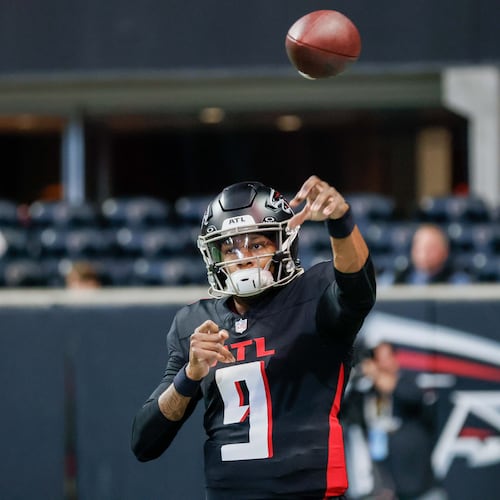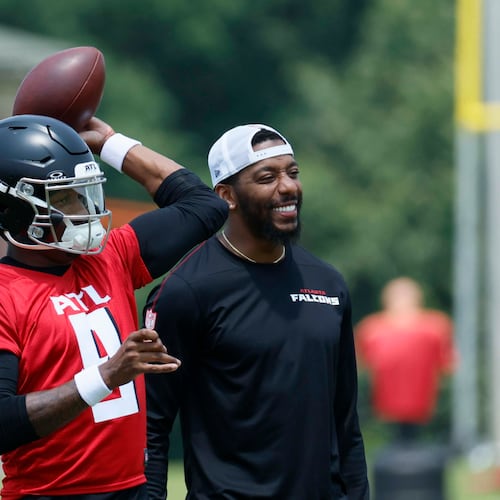Thomas Dimitroff called this a “dream” scenario for him.
It’s more than that for Scott Pioli.
For 16 years, Pioli worked in the NFL with Bill Belchick. For nine of those years in New England, he helped Belichick build an organization that went to four Super Bowls and won three championships. Now, as an assistant under the Falcons’ general manager, Dimitroff, another product of the Belichick incubator, the two are going back to the Super Bowl for the first time since their days in New England.
And it’s against Belichick and New England.
“For me, it’s surreal,” Pioli said Monday. “I didn’t dream and hope that the opportunity would look like this. When I came to the Falcons, it was more about working with a close friend and hopefully going back to another Super Bowl. But I never thought about the other side and New England. Because as cool as this is, it’s tough. It’s going to be a bittersweet moment for someone.”
Pioli was given clearance by the Falcons to speak publicly for the first time since his hiring in 2014. He has been a part of a group, with Dimitroff, coach Dan Quinn and others, that has rebuilt the roster with talent and youth, seemingly setting up the Falcons well for the future.
He has been kind of a voice in background. Background is good. He doesn’t mind that after a four-year reign in Kansas City didn’t end well in 2012. He took a year off to decompress and re-evaluate what went wrong, then accepted Dimitroff’s offer to come to Atlanta in 2014, reuniting the Patriots’ former top two personnel men. To say it has worked out would be an understatement.
“Scott’s obviously a long and trusted friend of mine and a trusted aide,” Dimitroff said. “He’s a guy I can go to on many things, whether it’s personnel matters or handling situations that come up as a leader in the NFL. We’re fortunate to have him here.”
Dimitroff grew under Pioli, briefly in Cleveland and later in New England. Pioli flourished under Belichick, who gave him autonomy to hire anybody he wanted. Pioli’s background was in college. Belichick taught him about the NFL and “about work habits.”
The subject then turned to Dimitroff.
“Thomas, because of our relationship and we’re only a year apart, he’s helped me from a personal standpoint to lighten up a little bit,” he said. “My intensity at times is a blessing and a curse.”
(This would be disputed by nobody.)
“We won three Super Bowls in New England and Thomas was there for the second and third,” Pioli said. “I remember after the second one, the next day I was like, ‘We’re behind in free agency! We’re behind in the draft!’ Thomas was like, ‘Bro, aren’t you going to enjoy this for a while?’ I was like, ‘But Thomas, we’re behind! We’re late for draft meetings!’ He’s all like, ‘Dude, slow down. Enjoy this.’ That intensity really helped me in my career but it can also be a little dysfunctional.”
Dimitroff also has been struck by the irony of this Super Bowl matchup. He called Belichick, “one of my mentors.” He acknowledged that the Falcons have a “northeastern stamp” on them, in the way they scout players and make personnel decisions, also similar to what Quinn was a part of in Seattle.
“I grew up in football with my dad,” Dimitroff said. “But it wasn’t until I got to the Patriots that I truly realized, at the core, of the team concept. I grew up hearing about it all the time but being a part of it in New England, I’ll take that with me forever.”
Dimitroff’s Cleveland beginning is a story worth retelling. His father, Tom Sr., was a long-time Cleveland scout. Thomas was a 26-year-old former history and economics major trying to find his way in life. He took a job with the Browns’ grounds crew, ostensibly to get his foot in the NFL door. Many days, he would finish his work, then walk into the Browns building and watch film with Pioli, who was head of pro personnel.
Belichick would let Dimitroff read the Browns’ scouting reports — even though he also was at the same time employed as a part-time scout for Kansas City.
“Think about that,” Dimitroff said, laughing.
Dimitroff scouted small colleges on weekends, then during the week, “I would be pulling tarps and painting fields and smelling a lot of pesticides. Then I’d walk in and put my butt down next to Pioli and he’d be like, ‘What is that (smell)?’ Then I’d vent a little, like, ‘Is this really where my life is going in this profession?’”
Dimitroff, Pioli and Belichick remain close friends, beyond just their career ties. Pioli was so close with Dimitroff’s family in the Cleveland days that, after Thomas left to work for the Detroit Lions, Pioli secretly escaped Browns headquarters to help out his parents when Tom Dimitroff Sr.’s health significantly declined, before his eventual death in 1996. Pioli didn’t publicize his help because it was an awkward situation, Cleveland having fired the elder Dimitroff as a scout earlier. Dimitroff and Pioli are like brothers.
Belichick didn’t hesitate when Pioli wanted to hire him as a national scout in 2002 in New England. (Dimitroff eventually moved up to director of college scouting.) Dimitroff has such respect for Belichick that, as first disclosed in Michael Holley’s 2012 book, “War Room,” he phoned the New England coach the morning of the 2011 draft before trading Cleveland five draft picks for the right to move up and take Julio Jones.
Isn’t is strange to phone somebody from another team?
“Not if you’re allies,” Dimitroff said. “I was curious about his thoughts because here’s a guy who built football teams. It was a crossroads moment for me.”
Belichick “didn’t say bad move,” Dimitroff said. “But thinking about me and my career, he did say, “You do this move and it will be attached to you the rest of your career. He basically said, ‘I don’t know if I’d do it.’”
In other words, he wouldn’t. But Dimitroff, who had the structure of the deal in place for two weeks, pushed the button anyway. It has more than worked out.
Self-evaluation has benefited both Dimitroff and Pioli. The fact that both left New England under positive circumstances and for better jobs is partly why the two and Belichick have remained close.
“Some people leave situations when they’re angry or bitter,” Pioli said, “but those nine years were pretty remarkable. Those people who worked for me were dear friends.”
Pioli owns a summer home in Nantucket. He keeps a lot of his old Patriots T-shirts and hoodies there.
“When I’m out in the woods, cutting vines, I’ll put on an old T-shirt,” he said. “I can wear it there and not get yelled at.”
About the Author
Keep Reading
The Latest
Featured



